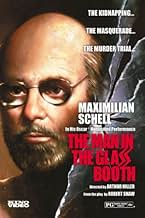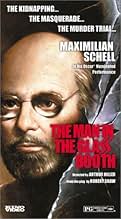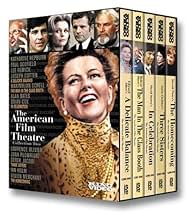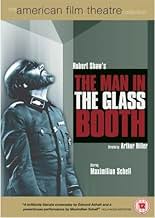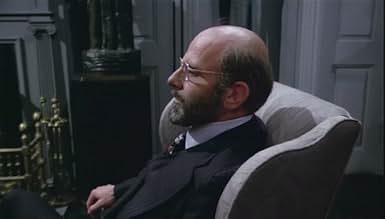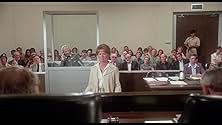CALIFICACIÓN DE IMDb
7.0/10
1.7 k
TU CALIFICACIÓN
Agentes del Mossad secuestran a un judío estadounidense, lo acusan de ser un criminal de guerra nazi fugitivo y lo llevan a Jerusalén para enfrentar un juicio por genocidio.Agentes del Mossad secuestran a un judío estadounidense, lo acusan de ser un criminal de guerra nazi fugitivo y lo llevan a Jerusalén para enfrentar un juicio por genocidio.Agentes del Mossad secuestran a un judío estadounidense, lo acusan de ser un criminal de guerra nazi fugitivo y lo llevan a Jerusalén para enfrentar un juicio por genocidio.
- Dirección
- Guionistas
- Elenco
- Nominado a 1 premio Óscar
- 3 nominaciones en total
Leonidas Ossetynski
- Samuel Weinberg
- (as Leonidas Ossettynski)
- Dirección
- Guionistas
- Todo el elenco y el equipo
- Producción, taquilla y más en IMDbPro
Opiniones destacadas
I have viewed this movie many times in a poor quality VHS and now finally on DVD. It's difficult to explain the impact this movie can have and one viewing will not do it. It takes several viewings to really get the plot line. Millionaire Jewish entrepreneur Arthur Goldman rules his financial empire from a penthouse apartment overlooking Manhattan. Seemingly at the edge of sanity, Goldman holds forth on everyting from Papal edicts to ex-wives, from baseball to his family's massacre in a Nazi concentration camp. When Goldman remarks on a blue Mercedes continuously parked outside his building, Goldman's captive audience of assistant and chauffeur dismiss their boss' anxiety as encroaching paranoia. But each of Goldman's passionate, seemingly capricious ravings are transformed into a shocking, inadvertent deposition when Israeli agents capture Goldman and put him on trial as Adolph Dorf, the commandant of the concentration camp where Goldman's family was supposedly exterminated. In a trial scene of unrelenting intensity, crafts what the Detroit Free Press called "a white-hot lead performance," mutating from eccentric Goldman to sociopath Dorf and beyond. The riddle of Dorf's true identity becomes wrapped in an enigma of cunning self-treachery and single-minded obsession.
7sol-
A fairly fascinating film, with a thought-provoking, albeit rather contrived, twist at the end, the material is helped a great deal by Maximilian Schell's Oscar nominated performance as the title person. Schell is startlingly good, considering what he has to do, balancing out two different eccentric personalities that are part of his one character. The character he plays is the most intriguing element throughout, but it does have a tendency to dominate, and therefore overshadow the things that film has to say. It also takes a while to get where its going, however the second half is highly intense stuff, and the film is merited by interesting ideas the whole time through.
10lousvr
A unique and terrific movie. Max Shell is the movie. One of his best acting performances. Complex plot calls for close focus and attention. It took quite some time to understand story due to its 'Cerebral layering' of just what is the goal of Shell's character. One very interesting note to movie is that it was based on a broadway play (which on opening had near riots by audiences due to misunderstanding of plot and closed shortly thereafter)and that was based on the original book, both written by none other then Robert Shaw (Capt Quint of 'Jaws' fame). Story is he was involved with the screenwriting or consulting, but in either case Shaw had his name removed in any connection with the movie. Why? Don't know. Unhappy with movie version?? The biggest trouble with this movie is that it is very, very difficult to find. Never shown on TV(where I originally saw on a PBS channel back in ~1979) or in most Video Catalogs. Find it.It's worth the effort. Best of luck.
The first half of "The Man in the Glass Booth" makes the viewer unsure of what to expect, as Maximilian Schell's protagonist - identified as a survivor of the concentration camps - orates about his experiences and desires. That's when everything changes. But even after this change, the protagonist maintains his attitude. So what's going to become of him, you ask.
The original source was Robert Shaw's 1967 novel, but it got adapted as a play in 1968, and the movie does feel more like a play. Quite a few things in the movie catch you off guard. In the end, it's a fine piece of work. A number of the scenes have a Hitchcock level of suspense. Definitely worth seeing.
The original source was Robert Shaw's 1967 novel, but it got adapted as a play in 1968, and the movie does feel more like a play. Quite a few things in the movie catch you off guard. In the end, it's a fine piece of work. A number of the scenes have a Hitchcock level of suspense. Definitely worth seeing.
The late Austrian actor Maximilian Schell first came to prominence in Hollywood in a supporting role as Nazi Marlon Brando's superior officer in the WWII epic THE YOUNG LIONS (1958); eventually, he became an international film star upon winning the Best Actor Oscar for Stanley Kramer's star-studded indictment of Nazi war crimes, JUDGMENT AT NUREMBERG (1961) which, despite the sheer brilliance of his performance, was a somewhat surprising accolade given that he was competing against Paul Newman's iconic characterization of Fast Eddie Felson in THE HUSTLER! Interestingly enough, two of Schell's future Oscar nominations also dealt with Nazism, namely THE PEDESTRIAN (1973; which Schell also directed) and the film under review which garnered him his second Best Actor nod. Once again, he came against an iconic performance – Jack Nicholson's Randle P. McMurphy in ONE FLEW OVER THE CUCKOO'S NEST – but lost out to it this time around; for the record, I have just came across the obscure GIVE'EM HELL HARRY which was the only Best Actor (James Whitmore) nominee from that same year which was still eluding me...
THE MAN IN THE GLASS BOOTH is the fourth of 14 productions from The American Film Theater that I have watched – following Lindsay Anderson's IN CELEBRATION (1975), Guy Green's LUTHER (1974) and Joseph Losey's GALILEO (1975) which more than anything sought to record and preserve renowned pieces of theatre that often featured notable actors. In this case, Arthur Hiller transposes Robert Shaw's play about a Jewish industrialist afflicted by the delusion of being a notorious Nazi officer; this controversial ruse undeniably elicits comparisons with THE RULING CLASS (1971) where Peter O'Toole's mad aristocrat first thinks he is Jesus Christ but then morphs into Jack The Ripper by the end of the film! Curiously enough, Shaw initially objected to Edward Anhalt's s adaptation of his material and asked to have his name removed from the film's opening credits; after watching it, however, he relented and agreed to put it back on but by then it was too late and, indeed, his name does not appear anywhere in the film's opening credits, In any case, there seems to have been no animosity between the two multi-talented actors as Schell eventually directed Shaw in END OF THE GAME (1975) and they co-starred in Shaw's untimely swan song AVALANCHE EXPRESS (1979).
Given the film's title, source of origin and subject matter, I was under the impression that the film would be entirely taken up by the trial which, when it actually comes on in the second half Is indeed riveting – with concentration camp survivors brought face to face with their tormentor; members of the aggrieved public rising from their seats to beat him up following his latest animated diatribe; Schell's own doctors 'confirming' his identity until one of them (Leonard Cimino) breaks down and admits that the evidence was planted by Schell himself! In this part of the film, the presence of passionate prosecutor Lois Nettleton and sensible Magistrate Luther Adler also makes itself felt. While the film's central conceit – a wealthy Jew exposed publicly as a notorious Nazi but ultimately emerging as a delusional Jew - is a fascinating one, it is quite contrived; in fact, the surprisingly fanciful first half, set atop paranoid Schell's NYC apartment, is somewhat heavy-going and even hard-to-take at times. That the film ends up being a worthy one regardless is mostly due to bald-headed, bearded and bespectacled Schell's tour-de-force performance; interestingly, despite the actor's Germanic heritage, he would again impersonate Jews in THE DIARY OF ANNE FRANK (1980; TV) and THE CHOSEN (1981). For the record, the copy I acquired suffers from lip-sync issues that can prove distracting at first but one grows accustomed to that fault before long.
THE MAN IN THE GLASS BOOTH is the fourth of 14 productions from The American Film Theater that I have watched – following Lindsay Anderson's IN CELEBRATION (1975), Guy Green's LUTHER (1974) and Joseph Losey's GALILEO (1975) which more than anything sought to record and preserve renowned pieces of theatre that often featured notable actors. In this case, Arthur Hiller transposes Robert Shaw's play about a Jewish industrialist afflicted by the delusion of being a notorious Nazi officer; this controversial ruse undeniably elicits comparisons with THE RULING CLASS (1971) where Peter O'Toole's mad aristocrat first thinks he is Jesus Christ but then morphs into Jack The Ripper by the end of the film! Curiously enough, Shaw initially objected to Edward Anhalt's s adaptation of his material and asked to have his name removed from the film's opening credits; after watching it, however, he relented and agreed to put it back on but by then it was too late and, indeed, his name does not appear anywhere in the film's opening credits, In any case, there seems to have been no animosity between the two multi-talented actors as Schell eventually directed Shaw in END OF THE GAME (1975) and they co-starred in Shaw's untimely swan song AVALANCHE EXPRESS (1979).
Given the film's title, source of origin and subject matter, I was under the impression that the film would be entirely taken up by the trial which, when it actually comes on in the second half Is indeed riveting – with concentration camp survivors brought face to face with their tormentor; members of the aggrieved public rising from their seats to beat him up following his latest animated diatribe; Schell's own doctors 'confirming' his identity until one of them (Leonard Cimino) breaks down and admits that the evidence was planted by Schell himself! In this part of the film, the presence of passionate prosecutor Lois Nettleton and sensible Magistrate Luther Adler also makes itself felt. While the film's central conceit – a wealthy Jew exposed publicly as a notorious Nazi but ultimately emerging as a delusional Jew - is a fascinating one, it is quite contrived; in fact, the surprisingly fanciful first half, set atop paranoid Schell's NYC apartment, is somewhat heavy-going and even hard-to-take at times. That the film ends up being a worthy one regardless is mostly due to bald-headed, bearded and bespectacled Schell's tour-de-force performance; interestingly, despite the actor's Germanic heritage, he would again impersonate Jews in THE DIARY OF ANNE FRANK (1980; TV) and THE CHOSEN (1981). For the record, the copy I acquired suffers from lip-sync issues that can prove distracting at first but one grows accustomed to that fault before long.
¿Sabías que…?
- TriviaThis film was part of the American Film Theatre series, an experiment in marketing films (all based on plays) that would not otherwise have been able to get financing. Instead of being released to the general public, only people who purchased a subscription to the American Film Theatre series could buy tickets to any of its films. (Exceptions were made for movie critics and members of award-granting organizations, such as the American Academy of Motion Picture Arts and Sciences which awards the Oscars.) As a result, only a small number of people ever saw any of the films in their theatre runs. To enhance the value of the subscriptions, subscribers were guaranteed that the films would never be shown on television and never released to the general public. Legal issues connected with these guarantees kept this film from being available in any form for nearly 3 decades. It was finally released on DVD in 2003. The American Film Theatre experiment was abandoned after 2 years.
- ErroresThe Nazi Concentration Camps were run by the SS. The Wehrmacht (the regular German Army, also referred to as the Heer) was not directly involved in running the camps. Also The SS used it's own rank titles, so Dorf would have been known as a Standartenfuhrer instead of an Oberst (Colonel).
- Citas
Arthur Goldman: Passion play is a passion play.
- ConexionesFeatured in Sunset Over Mulholland Drive (2019)
- Bandas sonorasEs war ein Edelweiss
(uncredited)
Written by Herms Niel
Sung by Lawrence Pressman and Maximilian Schell
Selecciones populares
Inicia sesión para calificar y agrega a la lista de videos para obtener recomendaciones personalizadas
- How long is The Man in the Glass Booth?Con tecnología de Alexa
Detalles
- Fecha de lanzamiento
- País de origen
- Idiomas
- También se conoce como
- El hombre de la cabina de cristal
- Locaciones de filmación
- Productoras
- Ver más créditos de la compañía en IMDbPro
Taquilla
- Presupuesto
- USD 1,000,000 (estimado)
- Tiempo de ejecución1 hora 57 minutos
- Mezcla de sonido
- Relación de aspecto
- 1.85 : 1
Contribuir a esta página
Sugiere una edición o agrega el contenido que falta

Principales brechas de datos
By what name was The Man in the Glass Booth (1975) officially released in India in English?
Responda
